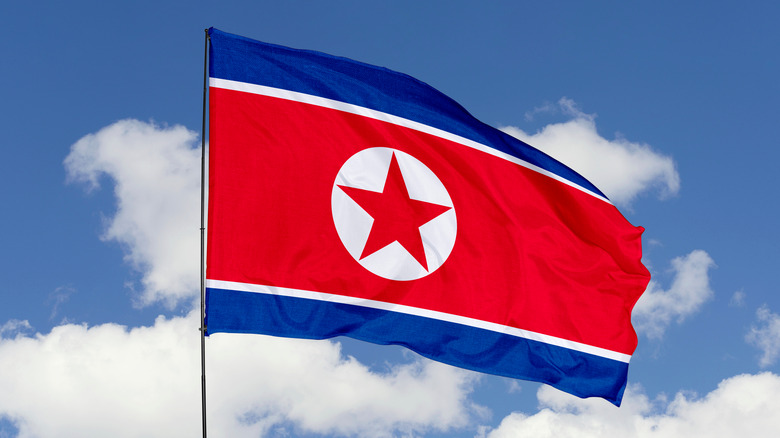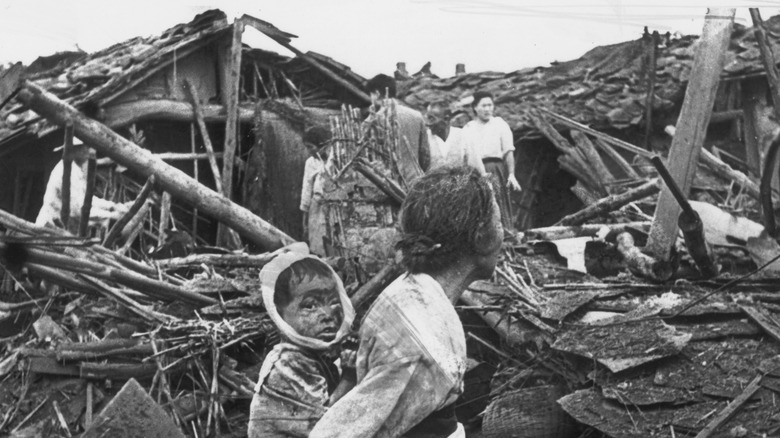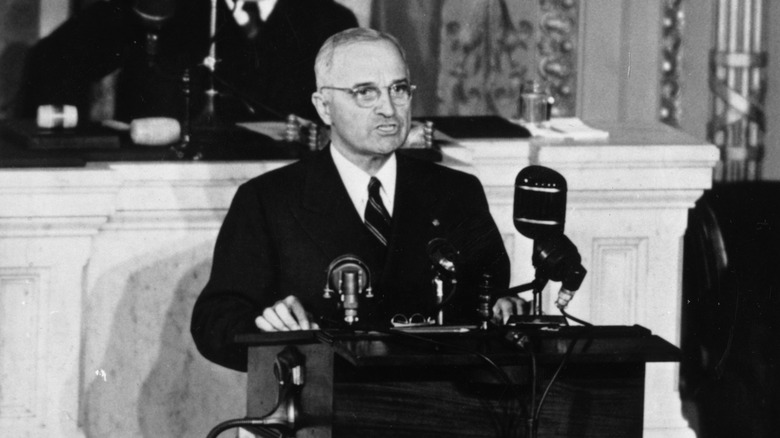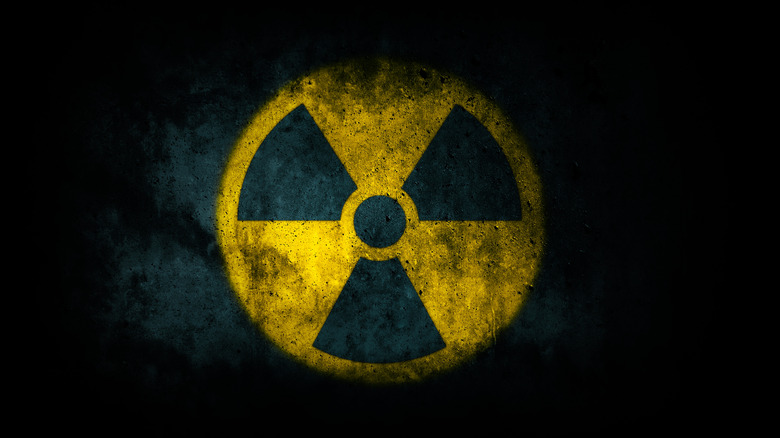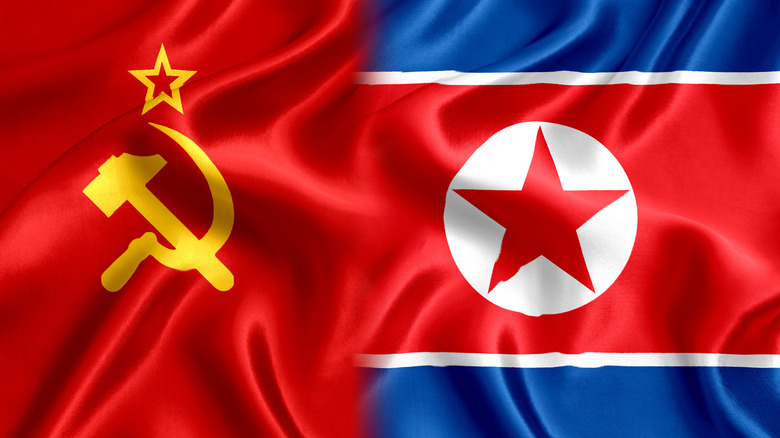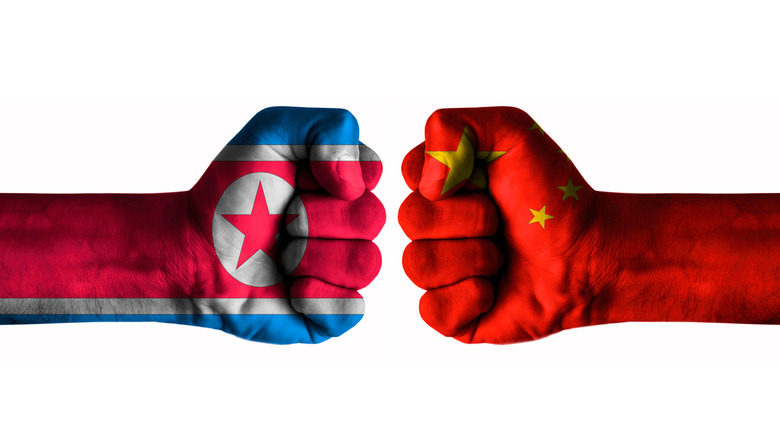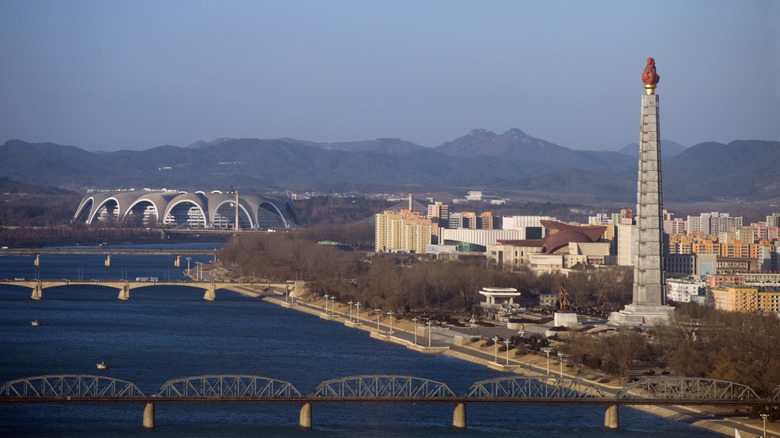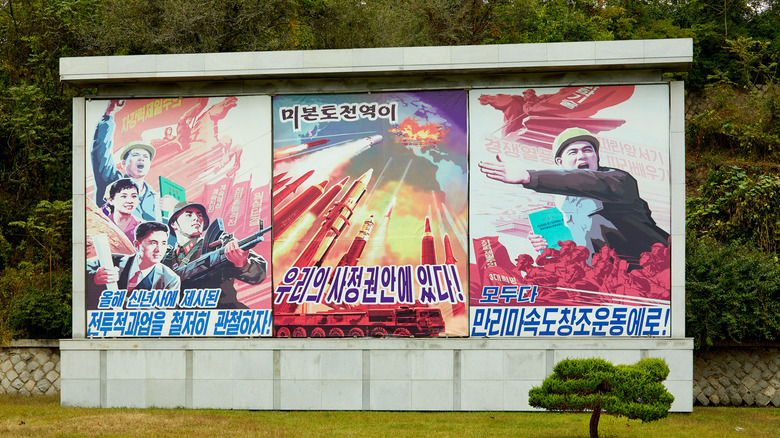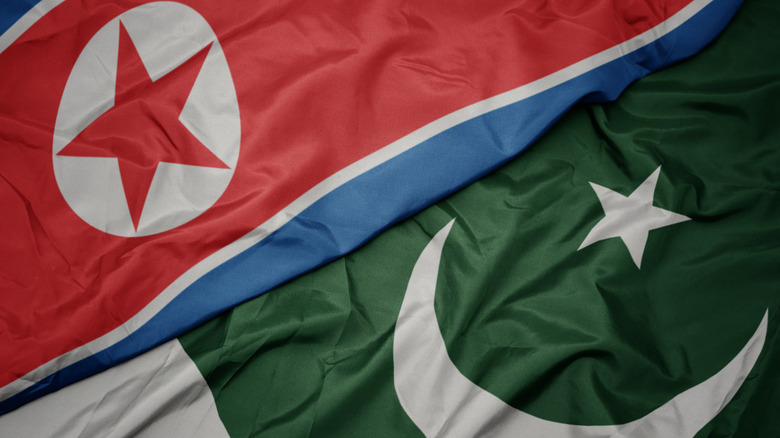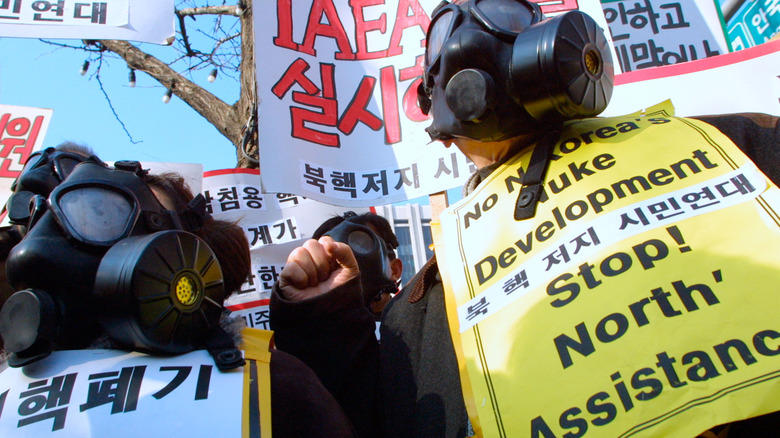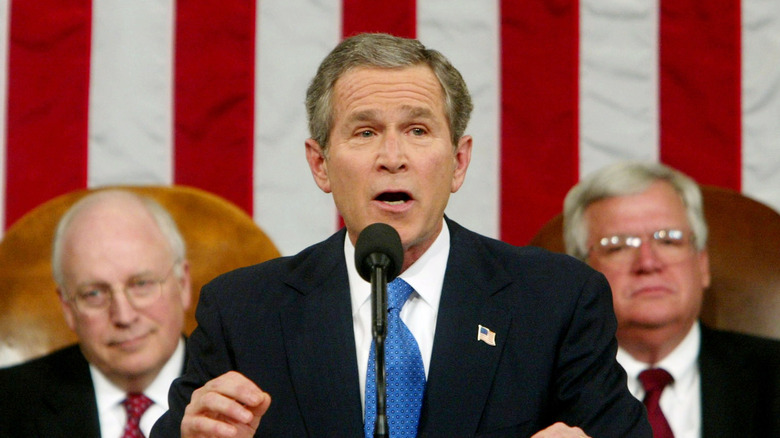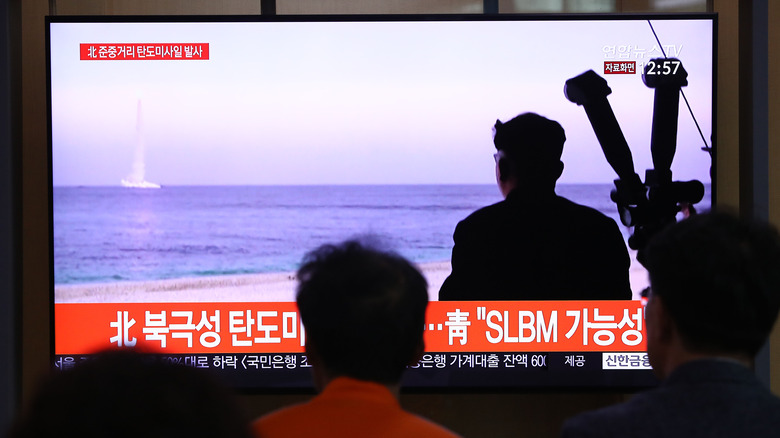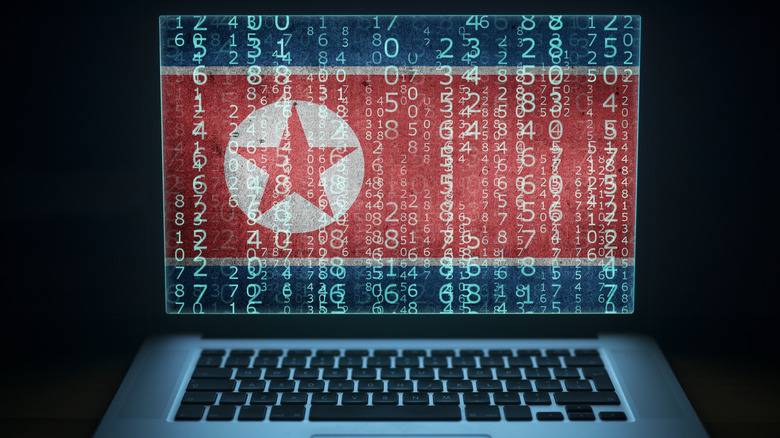How North Korea Became One Of The Few Countries With Nuclear Weapons
The Democratic People's Republic of Korea is run by Kim Jong-un. Like most dictators, he has a lot of titles, per The Christian Science Monitor: the first secretary of the Workers' Party, the chairman of the party's Central Military Commission, and the supreme commander of the Korean People's Army, among others. Some titles were held by his late family members and are considered symbolic, with the intention of boosting his authority over the country. Yet even with all of these titles, Kim technically "shares" power with his father and grandfather, despite their being dead. "Kim Jong-il remains 'eternal general secretary' and Kim Il Sung is 'eternal president,'" CNBC reports.
As the leader of North Korea, Kim has power over all facets of its operation, including nuclear weapons. And how it acquired them is a story as strange, unbelievable, and tragic as the country itself.
North Korea was destroyed during the war
After the Japanese Empire surrendered in 1945, it handed its former imperial territory of Korea to the United States and the Soviet Union to administer. Ostensibly designed to nurse and guide the country back towards self-governance, the plan suffered from the fact that the U.S. and USSR divided the country in half, which quickly led to de facto separate governments on both sides. By 1948, the split was official, and the Republic of Korea (south) and the Democratic People's Republic of Korea (north) were born.
Hostilities between the two Koreas began immediately. Northern spies and saboteurs committed assassination in the South, Southern soldiers would massacre border villages, and troops from both countries frequently clashed at the border. The actual war began in 1950 when the North invaded the South, who asked for international help and got it. The North started the clash, but during the active portion of the Korean War, the U.S. and its allies basically killed up to 20% of the population. "We went over there," General Curtis LeMay is quoted in the Intercept as saying, "and fought the war and eventually burned down every town in North Korea."
While there's no shooting anymore, the Korean War is technically still active. Plus, the North has a long memory, as Asia policy expert Kathryn Weathersby said in The Washington Post. For the North, "it is still the 1950s ... and the conflict with South Korea and the United States is still going on."
President Truman said he considered using nukes in Korea
The Korean War was the first major military intervention for the fledgling United Nations. Twenty-one nations contributed to the defense of South Korea, but the Americans were in the lead and everyone knew it. The U.S. military dictated the course of the war, with General Douglas MacArthur in charge of the U.N. forces. MacArthur was famously fired by President Harry Truman for publicly contradicting him and demanding to be allowed to nuke China. Smithsonian quoted General Omar Bradley describing it as a "strategy would involve us in the wrong war, in the wrong place, at the wrong time and with the wrong enemy."
Nuclear bombers were stationed in the Pacific Ocean in the very first month of the war. In Air & Space Magazine, historian Roger Dingman said the approach was designed "to counter the impression of ineffectiveness conveyed by the meager results of American bombing in Korea." When the Chinese entered the war with massive numbers of veteran soldiers, the successes of the U.N. forces were quickly overturned. What had been widely seen as a thorough route of the North turned into a meat grinder for all sides. On the second November of the war, seven months after firing MacArthur, President Truman said in a press conference that the U.S. was considering using nuclear weapons in Korea. This turned out to be a bluff, as the bombers returned home having never even deployed to Korea.
North Korea has its own uranium mines
President Truman's restraint from using atomic weapons in Korea impresses many historians because at that point, the United States was the only country in the world with offensive nuclear weapons capability. The Soviet Union had tested its first weapon only the year prior and wouldn't have nuclear bombers for a few more years, while the Chinese wouldn't start its tests for a few years. Of course, they would all catch up eventually.
North Korea is surrounded by nuclear weapons: Russian nukes, Chinese nukes, and American ones in South Korea. And events would increasingly isolate the tiny country. "The Sino-Soviet split of the late 1950s and the U.S.-led détente with China in 1972," explains the Pacific Forum foreign policy think tank, "supported North Korea's aspirations for developing nuclear weapons." They quote North Korea's founder, Kim Il-sung, as saying that nuclear weapons are necessary to "protect its sovereignty against the internal and external enemies."
The Russians began importing radioactive materials from North Korea in 1947 — before the country technically existed — and China would follow suit after the war, according to a timeline from the Nuclear Threat Initiative. According to a Stanford study, even though only one mine is publicly acknowledged, there are up to 18 possible uranium mines in the country. And North Korea is encircled with nukes, is headed by a family of paranoid leaders, and is one of less than two dozen uranium-producing countries — yeah, they likely pursued nuclear weapons.
The USSR helped North Korea
Sitting between nuclear powers and atop nuclear fuel, it was only natural that in 1956, North Korea would become a founding member of the Joint Institute for Nuclear Research. For decades, Soviet research facilities welcomed North Korean physicists, Soviet universities trained North Korean engineers, and Soviet expertise built North Korea's nuclear infrastructure. According to a timeline compiled by the Nuclear Threat Initiative, in 1958, the Korean People's Army built the "Atomic Weapons Training Center" with Soviet help. The following year, Russia "agrees to provide technical assistance in the establishment of a nuclear research center in North Korea." In 1964, Russian technicians designed and constructed the North's first nuclear research reactor, and it was used for medical and industrial research. Just two years later, it went critical.
During the 1960s, the USSR built or donated several reactors, reactor assemblies, research labs, and assorted nuclear components in North Korea. By the middle of the decade, "North Korean technicians learn plutonium-reprocessing techniques while receiving training at Soviet plutonium separation facilities and laboratories." And according to the NTI timeline, defectors claim that Pyongyang stocked its Pakch'ŏn-kun facility with nuclear capabilities thanks to the help of France and Austria. By the end of the decade, another defector said Kim Il-sung ordered the North Korean military to actively pursue domestic nuclear weapons production.
China and North Korea are fair-weather friends
China is so ancient that the American Historical Association calls it "the oldest living civilization," with over 3,500 years of written history and an archaeological record nearly three times as long. China's borders expanded and contracted multiple times over the millennia, and what counted as "China" at any given time could be kind of complicated. Per Al-Jazeera, this uncertainty complicates China's current international relationships when they make "historic" claims to territory that is generally recognized as belonging to nearly a dozen other countries. And this made for delicious irony when two North Korean leaders asked two Chinese leaders in a row to recognize Korean sovereignty to northeast China.
As reported by Asian Nikkei, Chinese historian Shen Zhihua said former North Korean leader Kim Jong-il once demanded to inspect the Chinese side of the border. The move was allegedly driven by former Chairman Mao, who told his father — former leader Kim Il-sung — that "the entire 'northeast' [of China] belongs to us." North Korea has yet to press these claims hard because the two nations are officially allies. Nevertheless, a tense relationship has persisted between them. According to Korean magazine Hankyoreh, Chairman Mao objected to Kim Il-sung's quest for a nuclearized North, asking, "Does Choson [North Korea] really need to go to that length?" When China engaged South Korea diplomatically in 1992, the North was only further encouraged to go that length — alone. In 2017, Professor Shen said the DPRK's nuclear antics mean that "[North] Korea is now China's potential enemy."
North Korea has a peculiar self-reliant philosophy
North Korea started life as an overtly communist project. The Soviet Union was its biggest ally until it collapsed; meanwhile, the People's Republic of China devoted hundreds of thousands of troops to its defense in the Korean War and remains one of the North's few trading partners. Reading the first line of North Korea's constitution seems to confirm its Marxist bonafide, but it quickly veers into the weirdness the country is known for. "The Democratic People's Republic of Korea is a socialist fatherland of Juche which embodies the idea of and guidance by the great leader Comrade Kim II Sung," it reads, via the Constitute Project.
That statement embodies both the country's special brand of Stalinist personality cult as well as their Darwinian modification to socialist philosophy. "The Juche idea is based on the philosophical principle that man is the master of everything," Kim Jong-il said (via Columbia Law School). Speaking to Vox, North Korean scholar David Kang explained that the term is generally translated as "self-reliance" and is an umbrella term encompassing nationalist, socialist, and Confucian values "that can be deployed however the leader wants."
"The Korean people value the independence of the country," says the government's official explanation, and "under the pressure of imperialists and dominationsts, have thoroughly implemented the principle of independence, self-reliance, and self-defense." North Korea stands alone, by design, and it needs to defend itself. According to the Associated Press, the North even calls nuclear weapons the "treasured sword" of Juche, or "Juche shells."
North Koreans are proud of their nukes
North Koreans are marinated in propaganda and indoctrination. In an interview with Vox, professor of Korean philosophy Don Baker said their national philosophy of Juche is basically a state religion. "Human beings don't need God," he said. "They now have the Kim family." And the pinnacle of Juche expression is through North Korea's nuclear might.
In a 2019 blog for the Wilson Center, North Korea Associated Press reporter Jean Lee spoke of the country's use of military propaganda. "During my years reporting in North Korea, I saw rockets on posters, stamps, and calendars," she said. "Every child wanted to be photographed in front of the rockets at the kimilsungia and kimjongilia flower shows." She described going to the capital city's biggest supermarket and buying school notebooks decorated with missiles. Children especially are targets of the regime's indoctrination, and North Korean students are literally taught to hate America and support everything that could destroy it. "And there's no illusion that these are rockets meant for space," said Lee, "the walls of kindergartens I have visited feature murals with tanks and missiles in flight — and children cheering them on."
The propaganda suggests that having nukes is evidence the Kim family has delivered on its promises. Lee recounts a scene from one of their most popular TV shows where the characters stop their antics to celebrate a Korean nuclear missile launch against the U.S. "It's a telling indication of how the weapons are used as a way to build a sense of pride and unity among North Korea's long-suffering population," she said.
Pakistan helped North Korea get nukes
Pakistan had "the world's fastest-growing nuclear stockpile" as recently as 2011, according to the Nuclear Threat Initiative. The country exists in a quarrelsome region and shares one of the most turbulent borders in the whole world. Pakistan was formed from a violent partition from India, and the nations have fought two wars and multiple border skirmishes over the last 70 years. The Pakistani president declared back in 1965 that "if India builds the bomb ... we will get one of our own," and though it took them twenty years, they did.
India and Pakistan both officially joined the nuclear club in 1998. However, India detonated its first test device in 1974. According to Outrider, Dr. Abdul Qadeer Khan was a Pakistani nuclear scientist working in Amsterdam at the time, and when India detonated its nuke, he volunteered his skills to the Pakistani government. Khan also provided it with "classified plans for a centrifuge that would create bomb-grade uranium" he stole from his employer. Khan spent the next thirty years not only building his nation's nuclear infrastructure but also giving "Iran, North Korea, and Libya the building blocks they needed to create nuclear weapons." And as it was mutually beneficial for both countries, Pakistan shared centrifuge technology so North Korea could militarize its uranium in exchange for missile technology for Pakistani nuclear bombs. In 2004, Dr. Khan was punished for disseminating weapons of mass destruction technology with five years of house arrest.
North Korea signed the Nuclear Nonproliferation Treaty
You'd be forgiven for thinking that the Cold War was just a chain of intercontinental ballistic missile factories cranking out weapons every year. But in fact, efforts to reduce the growth, dissemination, use, and very existence of nuclear weapons began early on. By 1968, the Treaty on the Nonproliferation of Nuclear Weapons (NPT) was introduced in the United Nations for signature by member nations. "The Treaty represents the only binding commitment in a multilateral treaty to the goal of disarmament by the nuclear-weapon States," says the U.N. Office for Disarmament Affairs. The NPT has not, unfortunately, been very effective. When it was designed, there were only five states with nuclear weapons (U.S., U.K., Russia, China, and France), but now, even though 191 countries signed the Treaty, there are near twice as many.
According to the Arms Control Association, three nations (India, Pakistan, and Israel) have yet to sign the NPT. And even though Israel "does not admit or deny having nuclear weapons," all three "are known to possess nuclear weapons." In 1985, due to Soviet pressure, North Korea actually signed the Nuclear Nonproliferation Treaty and publicly committed to a denuclearized Korean peninsula seven years later, per the Council on Foreign Relations. Still, they threatened to withdraw from the NPT just one year later over the indignation of "inspections by the International Atomic Energy Agency" and finally withdrew from it in 2003.
President Bush put North Korea in the axis of evil
The events of September 11, 2001, essentially pit Americans against the rest of the world. In an address to Congress a week after the event, President Bush basically proclaimed the next two decades of American foreign policy. "Either you are with us, or you are with the terrorists," he said, per Voice of America. A few months later, in his State of the Union address, Bush got a bit more specific: "States like these [North Korea, Iran, and Iraq], and their terrorist allies, constitute an axis of evil, arming to threaten the peace of the world" (via The Washington Post).
Not even a year later, North Korea officially withdrew from the Nuclear Nonproliferation Treaty. In its statement about exiting the Treaty, the North Korean government directly referenced the "axis of evil" comment and accused the U.S. of "[singling out North Korea] as a target of [a] pre-emptive nuclear attack, openly declaring a nuclear war" (full text per the Atomic Archive). This lead many people, like scholars at the Middlebury Institute of International Studies, to observe that Kim Jong-il could easily argue "that North Korea's security requires a stockpile of nuclear weapons to deter a possible U.S. pre-emptive attack. They also said that "it would be difficult to imagine why North Korea would give up its aspirations to develop nuclear weapons."
North Korea officially became a nuclear power in 2006
In their declaration of withdrawal from the Nuclear Nonproliferation Treaty in 2003, the North Korean government said flatly that they "have no intention to produce nuclear weapons and our nuclear activities at this stage will be confined only to peaceful purposes such as the production of electricity." During the first rounds of the "Six Party Talks" (nuclear negotiations involving North and South Korea, USA, China, Japan, and Russia) that began later that same year, North Korea flatly "denies having a uranium-enrichment program," Per the Council on Foreign Relations. But Global News reported that the CIA suspected they "probably" already had a couple of plutonium warheads by that point.
The Six Party Talks proceeded apace, producing nothing except further angry rhetoric from North Korea and the U.S. In 2005, over $25 million of laundered North Korean assets were essentially seized by the U.S. Treasury, creating further tensions between the two in the talks. Later that year, a deal was reached: The U.S. promised not to attack North Korea, which promised to cease developing nuclear weapons. Nevertheless, the North tested their first nuclear bomb almost exactly a year later.
The United Nations condemned the test. The Security Council passed a unanimous resolution to place "sanctions on the DPRK, calling for it to return immediately to multilateral talks on the issue."
North Korea uses hackers and scammers to fund their nuclear weapons
Since becoming a nuclear power, North Korea has steadily increased its capabilities at the cost of becoming even more of a global pariah. Even more so with the accession to power in 2011 of the third generation of Kim to lead the Democratic People's Republic of Korea. In just three years, from 2013-2016, Kim Jong-un had ordered and completed "more tests of short-, medium-, and long-range missiles carried out ... than under his father and grandfather combined," says the Council on Foreign Relations.
For several decades, North Korea successfully financed and developed a domestic nuclear weapons program while subject to various sanctions from multiple countries. They haven't so much evaded those sanctions as they have found several alternative revenue models. As reported by Business Insider in 2017, for the longest time, North Korea relied "on manufacturing drugs and counterfeiting foreign bank notes." However, those activities have been supplemented or replaced by "smuggling products from endangered species, fake pharmaceuticals, and counterfeit cigarettes."
According to a 2021 U.N. report obtained by the Associated Press, North Korea has diversified further still, "using cyberattacks to help finance its programs and continuing to seek material and technology overseas for its arsenal including in Iran." The report accuses North Korea of stealing over $316 million in just one year through "malicious cyber activities," enabling them to evade international sanctions and continue building their nuclear arsenal.
